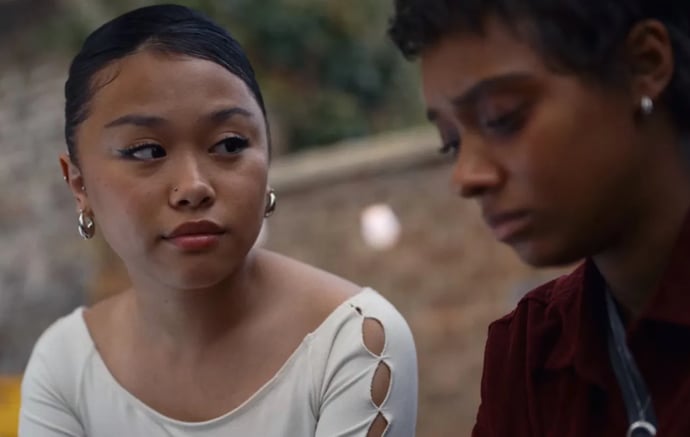Everything Now
Everything has to happen now for Mia Polanco, a teenage girl who returned from inpatient anorexia treatment to rapid changes in her friend group. "Everything Now" focuses on the necessity of slowing down – taking a step back is sometimes the only way to heal.
10/28/20234 min read


Introduction
Content Warning Overview: mention and portrayal of eating disorders (anorexia), drinking/drug use, mild sexuality (without nudity), and mild violence. A more detailed overview can be found on IMDB here: https://www.imdb.com/title/tt16287480/parentalguide?ref_=tt_stry_pg
How do you cope when it seems like the world is moving on without you? Everything Now covers so many serious and specific topics that it may be hard to determine if the show is "good" representation as a whole – but I think it hits the mark on what teenage insecurity can look like, especially when a person's struggling with their mental health.
Love Doesn't Conquer All
My favorite part of Everything Now is Carli and Mia's relationship. What could have been an overly romanticized but otherwise sweet portrayal of young love instead ended in a bittersweet conversation that was introspective and honest – and didn't give them a fairytale ending. When Mia meets Carli, she's already had one awkward 'date' and another embarrassing drunken moment. Carli is mesmerizing – and Mia can't take her eyes off her. What's even better is that they click – for the first time, we see Mia comfortably chatting and laughing with a stranger.
While both girls end up dating someone else for most of the season, unsurprisingly, by the end of the film they cheat on both their partners to be with each other. By the last episode, they run away from home to be with each other too. It's a common trope – two lovers who fight against anything or anyone who stands in the way of their love, and run off into the sunset together. Everything Now, necessarily asks the question of what next?
By almost 5 p.m., Mia still hasn't eaten anything, but tells Carli they should leave London just so she could have "one day to be free" outside of her recovery. Carli doesn't understand why Mia is in such a rush to complete her bucket list, so Mia tells her it's because the average recovery time for anorexia is seven years – if she makes it that far. Instead of the two running away, Carli tells her bluntly that she won't make it that far if she keeps running away. That gets through to Mia, who decides to return home, reconcile with her friends and family and speak to the doctor who helped her through inpatient recovery. And when she sees Carli again, she tells her that "hoping for you made everything brighter", that meeting her was the first time she felt something "stronger" than her own illness. She speaks to her as though Carli (or her love for her) was her savior. And if their conversation ended there, perhaps she would have been.


Carli's virtue once again is her honesty, telling Mia "I can't save you." We learn that in her own life, she spent years trying to "save" people. As a result, she knows that they can't be together until they learn to be "more than a fantasy to each other." And of course, Mia's not happy about this – of course, she says they can fix their relationship. But in the end, she accepts it without anger or blame.
Everything Now doesn't intend to portray a fantasy where love heals all – even mental illness. Nor does it argue that people struggling with their mental health shouldn't be in relationships until they're "healed." But it's unhealthy – even toxic – to view your partner as a solution for your mental health. Carli's testimony here matters a lot, because even in one sentence it reveals how exhausting it can be to serve as a savior for your partner.
And more importantly, even though Carli's struggles aren't the focus of the show, we know she has them. That's why they can't be a fantasy for "each other." I think this detail is especially important, because it implies that the visibility of their mental illness doesn't make a person a burden. Mia doesn't idolize Carli more than Carli does Mia because we see her anorexia recovery throughout the season – in fact, it is only through the pair's introspection and honest discussion of their mental health struggles that they realize what they want is not healthy – and what they need is painful. Thus, the only reason they need to breakup underscores the point of the show. They don't break up because Mia (or Carli) hasn't healed fast enough; they break up because they can't rush through their healing process, which is necessary to avoid giving each other an impossible task. The season ends with a bittersweet, but otherwise amicable breakup.


Contacts
manduta@ad.unc.edu
